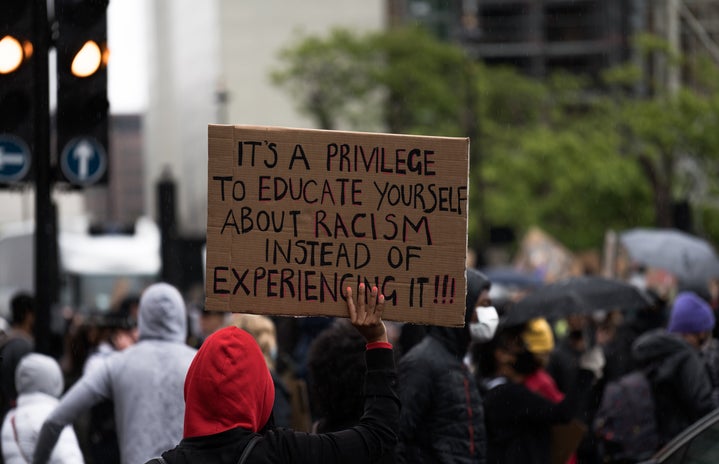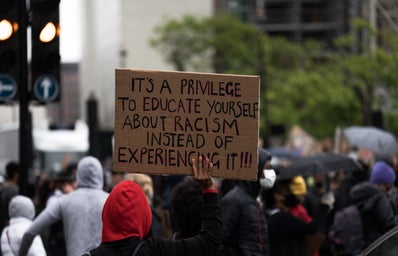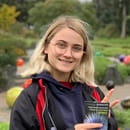If I’m being honest, it’s in middle school that I learned the most valuable life lessons. Things I think of everyday, like checking my pocket for my phone and keys. Is my wallet there? Have I locked my front door? Do I remember the time that my friend didn’t know how to tell me, at the age of twelve, that I was the only white person she’d met who didn’t make her feel sub-human? That instead she told me I’m the blackest white girl she knows, because whiteness is so intrinsic to racism that she couldn’t think of anything else to say but divide me from my race?
For some much needed context, I went to a predominantly black and Hispanic middle school (and I mean very predominantly; there were 15 white kids in my grade of nearly 300) in a historically black city. The public school system was severely underfunded since its beginnings, and neglected as a result of redlining (a discriminatory practice in which public services are restricted from neighborhoods considered financially unstable). It was a place where kids were jumping from one foster home to another, living under the poverty line, coming home to addicted parents, or coming home to no parents due to the rampant incarceration of black adults. The realities of my classmates were inconceivable to an upper-middle class, egregiously privileged, white teenager such as myself; the white students who shared my socio-economic status and lived in my pristine neighborhood so offensively close to post-redlined district starved of investment and care could never fathom the lives of our classmates.
But that’s the thing; we were all children, but not all of us got to act accordingly. For those who knew the reality of their situation, it often came out in indirect ways: starting fights with students or teachers, resigning to not understanding concepts rather than ask questions, discarding studies because they have seen the unjust sufferings of their community. None of us had the vocabulary to voice our frustrations; we were only twelve! How do you formulate that you know there are things you can and cannot do in this capitalistic, heavily racist world when you haven’t even hit puberty yet?
Nevertheless, bigotry doesn’t stop impacting you just because you have yet to formulate it into words. So, I continued to live in my little privilege bubble, being nice to my friends because that’s what I thought I should do, completely unaware of just how normalized their oppressions were. That is, until I was named the blackest white girl.
I don’t even remember what I was talking about until then, probably some rant about some anime my friends and I watched. Knowing me, I inevitably went on a tangent about bad representation or whatnot, when my black friend smiled and said, “Mathilde, you’re the blackest white girl I’ve ever met!”
Even back then I knew how significant that was, though not for the right reasons. At first, I thought I should take it as a compliment. For a lot of white allies, we seek to absolve our guilt over our participation in the white supremacist structure in a misguided attempt to turn our ally-ship into yet another site for self-improvement. If we can somehow just get rid of this ugly whiteness, of this blight that keeps people of color from knowing that I’m a good person, then I’ll have done the work of an ally. No need for the lifelong struggle demanded of me if I can just shed the skin of the slave-master, that’ll solve all my problems at least, and isn’t that what matters? With my friend’s words, I had just received the compliment that rid me of my whiteness, and it was from a black person too! I could no longer be racist! What a relief!
And yet, something else coiled in my stomach. For a long time, I didn’t know what it was, so I thanked her for the supposed compliment and went about my day. That memory receded as most do, and came back to me months later like a slap in the face.
Supposing that my friend meant to divorce me from my whiteness, to separate me from something that I so clearly am, meant that in her mind, the experiences with racism that she has dealt with in life had led her to decide whiteness and kindness are incompatible. She, a child, had experienced such poignant racism from white adults and peers, that she understood that whiteness meant a denigration of her blackness, of her own intrinsic and inescapable race. And I, at the same age, had not a clue, living in a world in which societal norms are on my side and “what I want to be when I grow up” is met with excited encouragement and endless of examples of success. For my friend, whiteness was the denigration that set her apart and away. To her, kindness was not something white people give out in white supremacist structure, and for me to be her friend and express basic consideration for racial justice, that is not something she had ever known. Thus, I could not be white because white meant evil.
To this day, I continue to live my life, remembering that a little girl called me black because of the deep hatred white bodies inflict on every black body.


